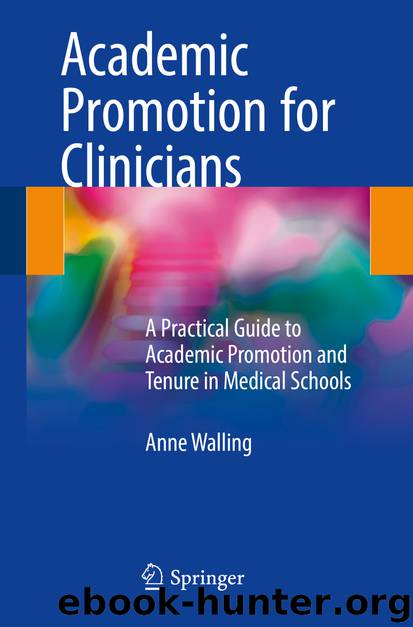Academic Promotion for Clinicians by Anne Walling

Author:Anne Walling
Language: eng
Format: epub
Publisher: Springer International Publishing, Cham
External Advisors and National Organizations
As described in the previous chapter, letters of recommendation from peers at other institutions may be required for academic promotion. External advisors or mentors can, however, be useful in other ways, and it is wise to seek them early in the career. Clinical faculty members often underestimate the potential usefulness of external advisors and national professional organizations. Every specialty has at least one organization for educators (e.g., Society of Teachers of Family Medicine (STFM) , Association for Surgical Education (ASE) ), and many have additional organizations for those in specific roles such as directors of clinical clerkships or residency programs. A listing of major organizations for clinician educators is provided as Appendix 3. Other national organizations relevant to medical education range from broad comprehensive associations such as the Association of American Medical Colleges (AAMC) and American Medical Association (AMA) to those focused on specific areas such as simulation or use of standardized patients. Similarly, clinical organizations include large national associations, specialty-specific academies, and groups focused on specific topics such as quality improvement, clinical documentation, or ethics and humanities in clinical practice. Organizations for women (e.g., American Medical Women’s Association (AMWA) ) and minority groups (e.g., National Medical Association (NMA) ) also offer career development and mentoring services.
Many institutions fund membership of professional organizations as a faculty benefit. Attendance at conferences may be funded as part of continuing medical education (CME) benefit or provided through travel grants if the faculty member is presenting at the conference. Joining one or more relevant national professional organizations early in one’s career provides opportunities to network with colleagues from other institutions and to access the national experts and latest information in specific areas of interest. From a promotion perspective, the faculty member needs to actively participate in conferences and opportunities offered by national organizations to build his/her CV, network with colleagues nationally, and cultivate potential referees for promotion. Ideally, a senior faculty member can introduce the junior faculty member to national contacts and teach him/her how to “work the meeting” and optimize resources available through the organization. National contacts can become long-term external collaborators or mentors as a career develops or may assist with specific projects or problems. They can provide advice on career development and preparation for promotion that may be more objective than that from an internal advisor but is limited by unfamiliarity with the home institution. Having national contacts in one’s specialty or area of interest is especially valuable for all faculty members seeking informed letters of support for promotion.
Download
This site does not store any files on its server. We only index and link to content provided by other sites. Please contact the content providers to delete copyright contents if any and email us, we'll remove relevant links or contents immediately.
| Dictionaries & Terminology | Drug Guides |
| Education & Training | Instruments & Supplies |
| Medical Atlases |
Periodization Training for Sports by Tudor Bompa(8273)
Why We Sleep: Unlocking the Power of Sleep and Dreams by Matthew Walker(6725)
Paper Towns by Green John(5191)
The Immortal Life of Henrietta Lacks by Rebecca Skloot(4588)
The Sports Rules Book by Human Kinetics(4387)
Dynamic Alignment Through Imagery by Eric Franklin(4217)
ACSM's Complete Guide to Fitness & Health by ACSM(4060)
Kaplan MCAT Organic Chemistry Review: Created for MCAT 2015 (Kaplan Test Prep) by Kaplan(4012)
Livewired by David Eagleman(3774)
Introduction to Kinesiology by Shirl J. Hoffman(3772)
The Death of the Heart by Elizabeth Bowen(3622)
The River of Consciousness by Oliver Sacks(3604)
Alchemy and Alchemists by C. J. S. Thompson(3522)
Bad Pharma by Ben Goldacre(3428)
Descartes' Error by Antonio Damasio(3279)
The Emperor of All Maladies: A Biography of Cancer by Siddhartha Mukherjee(3163)
The Gene: An Intimate History by Siddhartha Mukherjee(3098)
The Fate of Rome: Climate, Disease, and the End of an Empire (The Princeton History of the Ancient World) by Kyle Harper(3067)
Kaplan MCAT Behavioral Sciences Review: Created for MCAT 2015 (Kaplan Test Prep) by Kaplan(2986)
